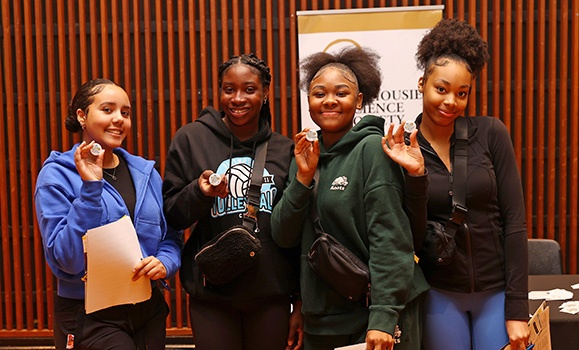Dalhousie’s Faculty of Science hosted its first-ever dedicated engagement event designed to establish connections between prospective Black and African Nova Scotian students and members of the Dal community.
More than 100 participants attended the day-long event on Tuesday (March 26) in the McInnes Room of the Student Union Building where they had a chance to meet current students, alumni, and faculty.
“Today is intended to give you a taste of what Dalhousie University can offer,” said Faculty of Science Dean Dr. Chuck Macdonald in opening remarks. “And hopefully you’ll have some fun along the way.”
After arriving via the Dal bus, attendees explored booths staffed by representatives from Faculty of Science programs and groups, including Imhotep’s Legacy Academy, the PLANS Global Health Office, and the Inclusive Pathways to Medical Professions initiative. After lunch, students heard from an alumni career panel, engaged in a round of science trivia, and broke into groups to tour the Aquatron, SURGE, and chemistry and biology labs. The day concluded with a short visit to the Black Student Advising Centre.
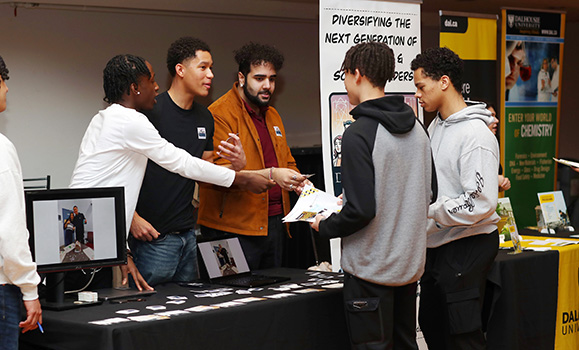
Attendees chat with students from the Dalhousie Science Scholars and Leaders Program.
Auburn Drive High students Ikenna Chinye, Sydney Stonehouse and Adina Mokoena were among the more than 50 prospective students from five local high schools in attendance.
Ikenna has his mind set on coming to Dal to study pharmaceutical science (“I’m planning on getting a scholarship, but even if I don’t, I’m guaranteed to come here,” he said), while Sydney is undecided on which university to attend but plans to study mechanical engineering.
“As a young Black woman, I am interested in learning about illnesses affecting the Black community,” Adina said. “It was great to participate in this engaging event and to see Black representation in science at a major university.”
All three students were encouraged to attend by Karen Hudson (BA’88, BED’91, MES’02), the principal of Auburn Drive High and the creator of the school’s Africentric Math Cohort.
“As a Dal alum, it was exciting to see so many Black students participate in the Faculty of Science Engagement Event at Dalhousie University,” Hudson said afterward. “These opportunities are valid for providing awareness of possible careers for students of African ancestry to network and discuss programs. It offered excellent and vital exposure for our students.”
Building community
Dr. Sophia Stone, a professor in the Department of Biology and the Faculty of Science’s associate dean, graduate studies and global relations, encouraged students to make connections with faculty members and alumni.
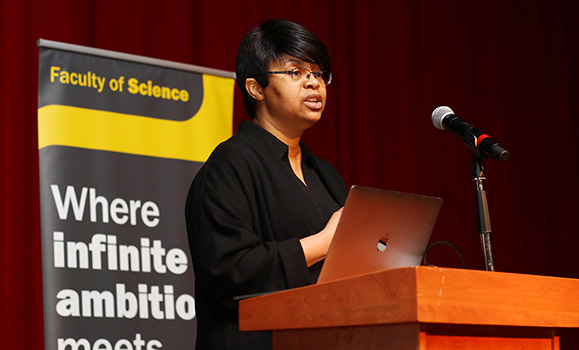
Dr. Sophia Stone.
“I didn’t always know what I wanted to do or how to do it, and this is where meeting people and asking questions is important,” Dr. Stone said, revealing that an undergraduate science degree took her on the path to a PhD and with it the opportunity to see the world. “We’re here to help you figure out where you want to go if you’re interested in science, so take advantage of us.”
First-year medical sciences student Eve Wedderburn echoed a similar theme, noting the importance of making connections. “It takes courage to get out and go talk to your professors or your deans,” Wedderburn said. “Trust me, they won’t hesitate to give you advice or guide you through your school work.”
She also emphasized forming bonds with fellow students.
“The Dal community is so large, and there are lots of different ways that you can reach out. You can meet other Black students, you can build connections with people that you can rely on, study with, have difficult conversations with.”
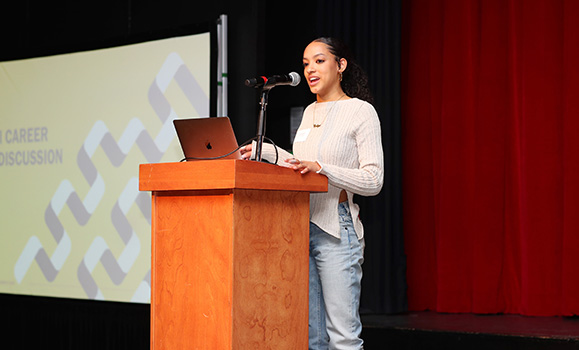
Eve Wedderburn.
Sharing experiences and perspectives
The idea for the event was conceived by Dr. Kevin Hewitt, the Faculty of Science’s associate dean, equity and inclusion and a professor in the Department of Physics & Atmospheric Science, and Jocelyn Adams Moss, the Faculty of Science’s manager, alumni engagement.
An outreach advocate who co-founded the Dal-based Imhotep’s Legacy Academy, Dr. Hewitt referenced Ebony McGee’s book “Black, Brown, Bruised: How Racialized STEM Education Stifles Innovation” in his opening address, explaining that underrepresented students are often motivated to use their future careers for social justice purposes.
“I’m here to tell you that science offers you that opportunity,” Dr. Hewitt said, noting that the work of his own bionanophotonics lab has recently focused on detecting medical conditions that disproportionately affect Black women.
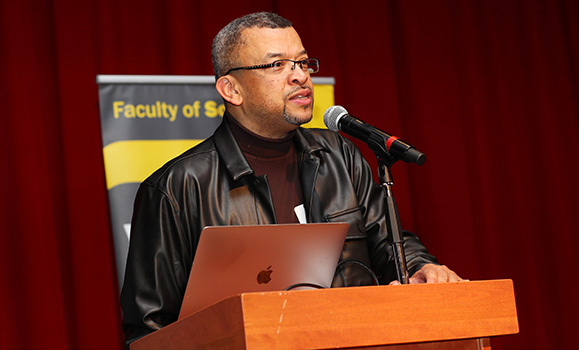
Dr. Kevin Hewitt.
Over lunch, Dr. Hewitt moderated a panel discussion with four Dal alumni: Gracious Kasheke (BSc’20), Leanne Lucas (MSc’13), Tiara Mulder (BSc’21), and Dr. Tesia Rolle (DDS’12).
The quartet discussed what led them to study science, the importance of mentorship, overcoming adversity, and their occasionally circuitous career paths.
“There are so many supports out there that can help you overcome challenges,” Mulder said. “Don’t give up just because things are hard. Sometimes the hard things are worth it in the end.”
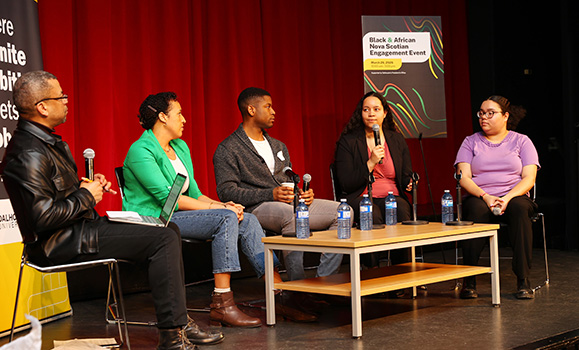
L to R: Panel moderator Dr. Kevin Hewitt with alumni Dr. Tesia Rolle, Gracious Kasheke, Leanne Lucas, and Tiara Mulder.
“This is only the beginning”
“Next year will be bigger and better,” said Dr. Hewitt afterward, reflecting on a successful inaugural event that came together thanks to efforts of numerous faculty, staff, and volunteers. “We need to continue to show Black and African Nova Scotian youth what’s possible when they see themselves in STEM fields. This is only the beginning.”
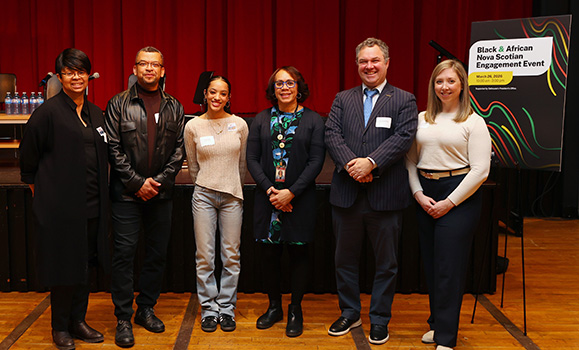
L to R: Organizers and speakers Dr. Sophia Stone, Dr. Kevin Hewitt, Eve Wedderburn, Karen Hudson, Dr. Chuck Macdonald, and Jocelyn Adams Moss.

